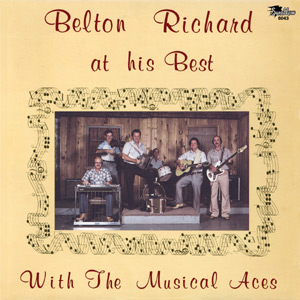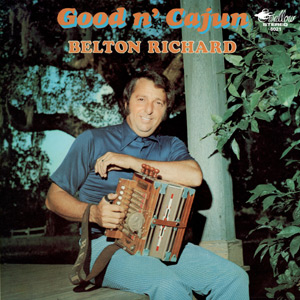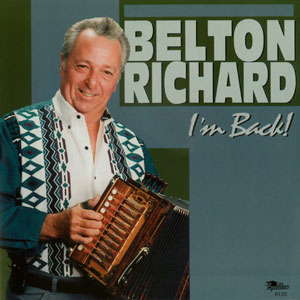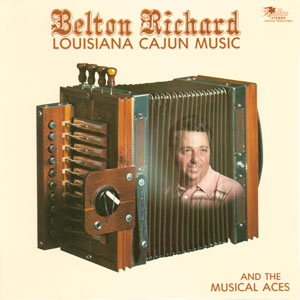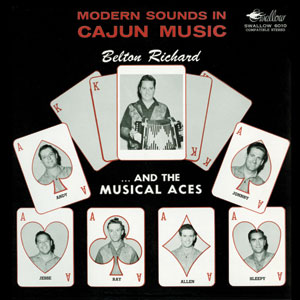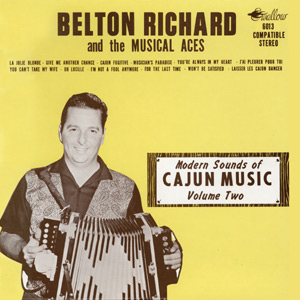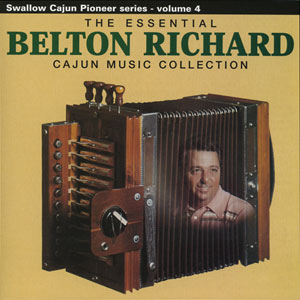Belton Richard
“Cajun Crooner & Pioneer”
Quick Intro
Belton Richard—born October 5, 1939, in Rayne, Louisiana—is celebrated as one of the most influential figures in modern Cajun music. With his rich baritone voice and masterful accordion playing, he seamlessly blended traditional Cajun sounds with the emerging swamp pop style, creating a unique and enduring musical legacy.
In-Depth Profile
At the age of seven, Richard began learning the accordion from his father, Cleby Richard. By twelve, he was performing with Neg Halloway and the Rayne Playboys. In 1959, he founded Belton Richard & The Musical Aces, a band that would become a cornerstone of the Cajun music scene.
During the 1960s and 1970s, The Musical Aces captivated audiences with their polished performances, often featuring a full band that included electric bass, a rarity in Cajun music at the time. Richard’s smooth, contemporary vocal style drew comparisons to country legend George Jones, and his accordion playing was both innovative and expressive .
Richard’s repertoire included original waltzes like “La Valse d’Ennui,” “Pardon Waltz,” and “Waltz of No Return,” as well as creative covers such as “Cajun Streak,” a French rendition of Ray Stevens’ “The Streak.” His ability to infuse traditional Cajun music with elements of rock and roll and rhythm and blues helped modernize the genre and expand its appeal .
After retiring from regular performances in 1987, Richard returned to the stage in the early 2000s, performing at various festivals and events. His contributions to Cajun music were recognized with several accolades, including induction into the Cajun French Music Association’s Hall of Fame in 1997 and the ‘Male Vocalist of the Year’ award in 2004 .
Belton Richard passed away on June 21, 2017, at the age of 77. His legacy continues to influence Cajun musicians, and his recordings remain a testament to his artistry and innovation .
Signature Tracks
-
“Un Autre Soir Ennuyant” — a French adaptation of Jimmy Clanton’s “Another Sleepless Night,” showcasing Richard’s ability to reinterpret pop hits through a Cajun lens.
-
“Pardon Waltz” — a heartfelt original waltz that became a staple in the Cajun music repertoire.
-
“Cajun Streak” — a playful French version of Ray Stevens’ novelty hit, demonstrating Richard’s flair for creative adaptation.
Notable Accomplishments & Awards
-
Inducted into the Cajun French Music Association’s Hall of Fame — 1997, its inaugural year.
-
Male Vocalist of the Year — 2004, awarded by the Cajun French Music Association.
-
Recognized for contributions to Cajun music and inducted into the Acadian Museum’s ‘Living Legends’ list in 2003.
-
The 1995 Festivals Acadiens et Créoles was dedicated to Richard, honoring his impact on Cajun culture.
- Louisiana Music Hall of Fame Inductee (2011)
Bonus Notes
-
Richard’s innovative use of the electric bass in his band, The Musical Aces, was among the first in Cajun music, helping to modernize the genre.
-
His smooth vocal style and sophisticated arrangements have influenced generations of Cajun musicians, including Johnny Sonnier and Wayne Toups
Album Reviews
Something Old, Something New
BluesRag Magazine — Written by Dan Willging (January 2021)
“A fitting close to an eight-decade legacy, Belton Richard’s return to the studio offers a beautiful blend of nostalgia and fresh energy.”
Octogenarian Belton Richard never thought he would step into a recording studio again at the twilight of his career. That is until Swallow Records’ Floyd Soileau approached him about recording a French version of Ernest Tubb’s 1965 hit “Waltz Across Texas.” Surprisingly, this had never been covered in Cajun music before, even with the numerous country songs Belton Richard translated into French during his heyday. Nonetheless, “Waltz” was a brilliant Cajun music candidate since waltzes are popular in both Louisiana and Texas dancehalls. The next day, Richard had a beautiful translation of Tubb’s classic titled “Valser la Louisiane.” He also informed Soileau he had written two new French songs, so, with his topnotch crew of musicians, Richard found himself back in the studio.
Emotionally speaking, Richard’s two originals, “Sunday Morning Streets” and “Pure, Pure Cajun,” couldn’t be more opposite of each other. The former is a sad, slow waltz about a distraught, lonely widower who drinks himself to death, while the latter, a lively two-step, finds a happier Cajun living life large.
To finalize the Something Old, Something New concept, Richard selected 10 previously recorded songs, a mixture of swamp pop, country, and R&B, that had never been released on CD. Included in this treasure trove of rarities is the oft-requested “Polycarp Phillip Pecot #2,” the theme song of the popular Lafayette children’s ‘60s television show Polycarp and Pals. Fifty-five years later, the reggae-ized tune (melodically similar to “Hang On Sloopy”) remains as infectious as ever.
Also featured is the original version of “Cajun Man” that was recorded by High Performance for its 2017 Cajun Cool album. With UJ Meaux’s rollicking piano accompaniment, Richard’s version still sounds great in a cool retro sense. (Meaux can also be heard pounding along on the swamp popper “I’ll Be Waiting.”)
Of special interest to George Jones fans is Richard’s rendition of “Big Fool of the Year,” the flip side to the Possum’s 1962 ‘45 rpm’ “A Girl I Used to Know.”
Considering there’s a 60-year span between the earliest song (“I’ll Be Waiting”) and the three Richard wrapped up last fall, his pipes are still remarkable and exude respectable power. Whether Richard ever records again is immaterial. This is a good one to close out an eight-decade legacy.
The Essential Cajun Music Collection, Volume 2
OffBeat Magazine — Written by Dan Willging (April 2019)
“If someone tells you Belton Richard isn’t cool, disown them, immediately.”
With interest mounting in the musical legacy of Belton Richard, it seems criminal that not all his discography has been released on CD, since virtually every contemporary Cajun band has recorded at least one song of the iconic legend, if not several. Some, like High Performance, the Pine Leaf Boys and T’Monde, have led this somewhat revivalist charge by introducing the charismatic baritone vocalist to the next generation. Though this mammoth two-disc, 49-track collection (1963–2003) contains fan-favorite selections from various LPs and CDs, the real centerpiece is the staggering 19 tunes, like “Aces Rock” and “Let the Little Girl Dance,” that were only released as 45s. Now casual fans can have what seasoned record collectors have all centralized in one place.
Of those 45 rpm rarities, two Lefty Frizzell tunes (“I Love You a Thousand Ways,” “Look What Thoughts Will Do”) are from Richard’s previous label Chamo. Interestingly, on both of these, Richard croons in English, something he rarely did. There are two versions of “Cherokee Waltz,” the released 1967 version and the original studio outtake where you hear the jovial banter and the false starts and stops.
According to High Performance’s Jamey Bearb, nearly all of Richard’s songs were popular and over time, audiences have come to appreciate lesser-known tunes like “Funny Face,” “Wedding Bells” and “You Can’t Take My Wife,” all heard here. There’s certainly a ton to digest: classic originals, Cajun standards and adaptations of French-sung country songs. If someone tells you Belton Richard isn’t cool, disown them, immediately.
Memories
OffBeat Magazine — Written by Big Geez (September 2008)
“A lively collection of feel-good music from the bayou — just what folks need to forget their troubles.”
A seemingly endless parade of tropical storms sweeping into the Southeast and blanketing bayou country leads me to one conclusion. It’s time to shrug off the bad weather and listen to Memories, a new album on the Swallow Records label from Louisiana swamp-pop legend Belton Richard.
Richard, who was born John Allen Guillot and is the offspring of Louisiana Cajun parents, has been a fixture on the regional music scene for many years.
During his long career, he’s performed just about every kind of music popular to the area, and along the way has become known as the ‘King of Swamp-Pop’.
This collection of 22 tracks offers up a sampling of Richard’s singing style through the years, with examples from every era of his colorful career. It also includes a variety of sounds that show his comfort with all kinds of material, as he crosses genres with ease. Examples range from the slow and bluesy “Come Sundown” to the rousing, rockabilly-styled “All By Myself,” which was probably my favorite on the album.
He’s also never been afraid to tackle songs that might be more familiar to listeners from other sources, such as the exotic “Isle Of Capri,” or “Before The Next Teardrop Falls,” a number-one hit for Freddy Fender. Richard does a good job with both pieces, although his strength is still with songs that echo his strong swamp-pop roots. He’s at his best with regional standards such as his own composition, “Wanting To Get Over You.”
The Essential Collection
Blues Art Magazine — Written by Norman Darwen (March 2006)
“This set proves there is much more to Belton Richard than ‘Promised Land’ — a truly essential collection of Louisiana swamp pop.”
Legend is one of the most over-used words in the music industry, but there can be no argument with its use here. John Allen Guillot was born in Rayne, Louisiana in 1938 and began recording twenty years later as a member of the Krazy Kats, having been singing and playing rhythm and steel guitar since early in the decade. He went on to become a schoolteacher and a tireless champion for Louisiana culture (his great uncle was the inimitable accordionist Joe Falcon); I interviewed him around two decades ago and he still strikes me as one of the most gracious people I have ever met!
But what of the music? Well, these days “American Roots Music” is also an over-used term but again, there is no disputing that Louisiana swamp-pop is roots music par excellence. Its spiritual home is on Floyd Soileau’s Jin label, and there are 25 slices of it here, in its purest form. There are plenty of those south Louisiana two-chord ballads that betray the influence of Fats Domino and others, all yearning vocals, droning horns, and tinkling piano; there is jerky New Orleans rock and roll with a Cajun accent, there are a few Country & Western tunes with a verse or two in French just to stamp a Cajun identity on them, there are a couple of items that could only come from listening to early sixties pop, there are some numbers that mix all these elements up together, and of course, there is “Promised Land.”
This set proves that there is much, much more to Belton Richard than this, his best-known number (in Europe anyway), but it is undeniably one of the finest two minutes on vinyl to come out of the US. Chuck Berry’s rocker, of course, with a furious, raw, driving rhythm, Richard’s impassioned vocal (and that endearing mistake in the lyrics), and the unforgettable wheezing accordion breaks — simply astounding, and if you don’t know it, I envy you the pleasure of hearing it for the first time!
The Essential Collection is the subtitle of this album, and that is indisputably the truth!
The Older the Wine, the Finer the Taste
Offbeat Magazine — Written by Dan Willging (January 2004)
“Here, the disc’s wine metaphor title says it all but it’s still wrong. It’s champagne, actually.”
Anyone possessing a Cajun music sensibility realizes Belton Richard still towers as one of the genre’s monumental figures. A superstar if there ever was one, Richard was never one to placate a crowd. Yet, given his steadfast, uncompromising spirit, he supplied Cajun music a much-needed facelift in the late ’50s. With the advent of rock ‘n’ roll, he introduced the electric bass and pioneered the big band sound with more complex arrangements. Though translating country songs wasn’t exactly new then, Richard utilized this technique heavily by singing cherished songs in the people’s language. When others released singles with a two-step on one side and a mourning waltz on the other, Richard daringly coupled waltzes. He incorporated swamp pop (then known as rock ‘n’ roll), yet always crooned in French. While his compositions remain a vital part of the repertoire, Richard’s powerful, peerless voice will be what’s first and foremost remembered.
Though these days Richard’s coiffure may be more silver than coal, his magnificent voice is still intact, able to unleash that signature Belton belt in seconds flat. With an exemplary cast of musicians including steel alum Rodney Miller, they tackle the barstool weeper “I Can’t Stop Loving You” and jerk a tiger’s tail (the Buck Owens staple) out of its socket. A half-dozen originals practically bear the stamp “future classic” (“What You Did With My Life,” “God Will Come For You”) with the majority being stomping waltzes that allow a Louisiana Purchase worth of expression. Kickin’ numbers “Dancehall Two Step” and “Knock Knock Knock” demonstrate how Cajun music is not a pretty and sittin’ around dainty thing but a get-after-it, all out bleeding knuckles slugfest. The last three tunes, Shirley Bergeron’s “J’ai Fait Mon I’dée,” and Lawrence Walker’s “Midnight Waltz” and “Reno Waltz,” unabashedly rival anything Richard has ever waxed. Here, the disc’s wine metaphor title says it all but it’s still wrong. It’s champagne, actually.

